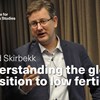recognizing
Subsistence Emissions and Climate Justice
British Journal of Political Science Abstract The climate justice literature typically endorses a moral right to produce subsistence emissions, but this right appears problematic considering how urgent
Research seminar with Vegard Skirbekk: Understanding the global transition to low fertility
Venue: Institutet för framtidsstudier, Holändargatan 13 i Stockholm Research seminar with Vegard Skirbekk, professor at Columbia Aging Center, Columbia University and senior researcher at the Norwegian I

Vegard Skirbekk: Understanding the global transition to low fertility
Globally, women are having half as many children as they had just fifty years ago. Why have birth rates fallen, and how will low fertility affect our shared future? The vast majority of current resear
Popular sovereignty facing the deep state. The rule of recognition and the powers of the people
Critical Review of International Social and Political Philosophy, published online first. doi.org/10.1080/13698230.2019.1644583 Abstract This paper investigates the relationship between the idea of popula
Christian Rostbøll: Why Struggles for Recognition Can Harm Democracy: On Populism, Respect, and Esteem
Venue:Institute for Futures Studies, Holländargatan 13 in Stockholm Research seminar with Christian Rostbøll, professor of political theory at the University of Copenhagen. Register here > AbstractIt (Cambridge University Press, 2023).
Modelling in Normative Ethics
Ethical Theory and Moral Practice Abstract This is a paper about the methodology of normative ethics. I claim that much work in normative ethics can be interpreted as modelling, the form of inquiry fami
Democratic Legitimacy, Institutions for Future Generations and the Problem of Constitutional Power
Chapter in Hélène Ruiz Valérie Rosoux Alessandra Donati (red.), Representing the Absent, Baden-Baden: Nomos Verlag. Find the full book here > Abstract Recognising widely held concerns regarding ‘presentchapter challenges the contention that democratic legitimacy inexorably requires the inclusion of futuregenerations in democratic decisions. According to two requirements of democratic legitimacy – inclusionand constitutional empowerment – people should be empowered to participate in decisions about policyand law, and to determine the rules structuring the political framework. Drawing a distinction betweenthese requirements, this chapter contends that though it may be feasible to ‘include’ future generations forproxy representation, future generations cannot enjoy ‘constitutional power’.
Climate change and affective conflicts
Sweden has just experienced some unusually warm weeks in June. In Spain, yet another heat wave is causing alarm. In a text published in the Spanish newspaper El País, philosopher Julia Mosquera descri
Is there a moral right to vote?
Ethical Theory and Moral Practice, pp. 1-13, DOI 10.1007/s10677-017-9824-z. Abstract The question raised in this paper is whether legal rights to vote are also moral rights to vote. The challenge to the

The socially sustainable society
A socially sustainable society is a society where people live well and feel safe. But such a society is constantly faced with challenges, from organized crime, differences in values and scarcity of resources, but also from ideas we have about each other that are not even conscious but can still affect the way we shape our society. This is our most comprehensive theme.








